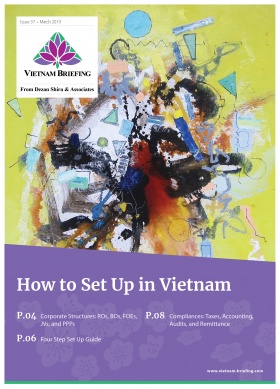Vietnam Ranked 70th for Ease of Doing Business: World Bank
- Vietnam ranked 70 among 190 economies in the World Bank’s Doing Business 2020 report.
- Vietnam’s reforms have focused on access to credit and payment of taxes.
- The country’s ranking slipped by a place and needs to do more in the area of resolving insolvency.
- Investor confidence in Vietnam is strong as FDI rose by 7.02 percent year on year in 2019.
Vietnam ranked 70 among 190 economies in this year’s Doing Business 2020 report released by the World Bank. The country fell one spot from its position last year. Nevertheless, Vietnam’s overall score improved by 1.44 points, scoring a total of 69.8 points.
In this year’s report, Vietnam ranked the best in the following areas of assessment – “Getting credit” and “Paying taxes”, ranking 25 among all the economies.
Vietnam’s performance was the weakest in “Resolving insolvency”, ranking 122 overall. In general, Vietnam improved in most areas, only declining in the overall score for “Resolving insolvency” for the second consecutive year.
Improvements in doing business
Building on efforts over the last few years, Vietnam has proactively improved its business and investment environment for foreign companies. Vietnam continues to be a magnet for attracting foreign direct investment (FDI). As of October this year, FDI into Vietnam rose by 7.4 percent year-on-year – showing an increase in investor confidence.
In the Doing Business 2020 report, Vietnam made noteworthy improvements in making it easier for businesses to access finance and run day-to-day operations.
Getting credit
Vietnamese authorities have worked on improved access to credit information through data distribution from retailers. The government understands that the country’s credit information market is underdeveloped and lacks competition and has therefore pushed to bring changes.
In May, this year, the Vietnamese government released a draft decree – which will replace Decree 10/2010/ND-CP – relaxing requirements imposed on an organization when establishing itself as a credit information firm.
This will not only reduce service costs and increase transparency in the market but also diversify the pool of credit information available. The draft proposes to relax the requirement of credit institutions of having at least 20 commercial banks providing it exclusive information.
Further, the National Credit Information Centre of Vietnam (CIC) and the State Bank of Vietnam (SBV) officially launched a portal connecting borrowers and credit institutions in October this year. Borrowers can now easily choose credit packages and register loan needs at the appropriate credit institutions through the online portal. On the borrower connection portal, borrowers are allowed to view their own credit information and credit scores, helping them monitor their credit levels as well as prevent fraud.
Paying taxes
Another major reform of this year is the electronic system managing the tax payment process for businesses. Investing in upgrading the information technology infrastructure used by the General Department of Taxation has made paying taxes an easier process for most businesses.
In the past few years, it could take businesses two to three working days to complete their tax payment processes; however, with the upgraded online payment systems, the process is much faster and can be completed within a day. According to Vietnam Customs, around 99 percent of import and export tax payments were made online as of June this year.
Such digitalization not only brings efficiency and allows businesses and authorities to reduce administrative costs but mitigates risk exposure for businesses where they are not forced to offer bribes and facilitation payments. In Vietnam, the land administration, construction sector, and public administration are especially prone to corruption.
Jaques Morisset – the World Bank’s Lead Economist and Programme Leader for Vietnam – notes that there are several regulations and a lack of coordination across ministries when it comes to tax payment. For example, the same document and information are often needed multiple times for an application or payment.
In a bid to ease tax complications, the Vietnamese government has worked on various proposals to amend the current value-added tax (VAT), corporate income tax (CIT), and special sales tax regulations. The aim of the proposals is to clarify unclear tax issues and reduce the tax compliance burden for businesses with operations in Vietnam. The proposed regulations streamline the country’s tax system to align with international best practices.
Digitization, streamlining administrative procedures is key
While Vietnam has made reforms in paying taxes and starting a business – these are still two aspects that Vietnam needs to continue to work on. The country still ranks low on the aspects of “starting a business” and “paying taxes”, ranking 115 and 109, respectively.
Moreover, the Doing Business report stresses the need for further digitalization and streamlining of administrative processes to boost the country’s business environment.
The government is already taking steps towards this and is speeding up the application of Industry 4.0 technology in the areas of business, cultural, and social life.
With the Vietnamese economy growing at a rapid pace, further reforms will undoubtedly improve the business environment in the country – attracting more investment and creating more jobs in turn.
About Us
Vietnam Briefing is produced by Dezan Shira & Associates. The firm assists foreign investors throughout Asia from offices across the world, including in Hanoi and Ho Chi Minh City. Readers may write to vietnam@dezshira.com for more support on doing business in Vietnam.
- Previous Article Vietnam Records High Female Employment But Challenges Remain
- Next Article Vietnam: Accordi di libero scambio – Opportunita` per il business.







